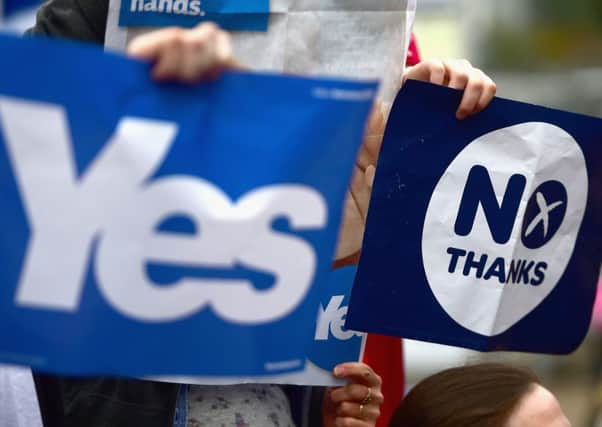Leaders: Mutual respect is vital in indyref campaign


The conditions do not look great. This campaign does not turn on usual election-time political banalities, nor is it an academic discourse on marginal gains and losses to be made or incurred. This is a battle which is stirring deeply held convictions – amongst nationalists who have fervently believed in and campaigned for nationhood all their lives, and amongst unionists who have taken the Union pretty much for granted all their lives and are now facing the possibility of the ground being swept from under their feet.
Even more emotively, the leaders of both sides have said this is a decision that cannot be revisited, as a government can be booted out of office in a few years’ time. If it is Yes, there will be no going back, Alistair Darling has said. If it is a No, there won’t be another referendum in a generation, Alex Salmond has stated.
Advertisement
Hide AdAdvertisement
Hide AdAs this sinks in, emotions are bound to run higher still. Both camps need to recognise this and think about their actions. Followers take their lead from leaders’ words and a few ill-chosen ones could have consequences that, at best, reflect no credit on Scots’ maturity.
In a modern democracy, everyone is entitled to express their opinion. And for a decision like this it is vital that voices other than those of politicians are heard. That includes chief executives of companies whose business, staff, and customers could all be affected by an outcome either way.
It is absurd to pretend that there will not be winners and losers; if a Yes vote does not mean great changes will happen, why are we bothering to vote on it?
Alex Salmond has accused David Cameron of intimidating bosses of big companies into publicly backing a No vote, claiming that encouraging comment was effectively bullying. This seems improbable, as leaders of firms tend not to be people who are easily coerced. But yesterday Mr Salmond made great play of the respected business leaders backing the Yes cause.
All business leaders on both sides are responsible to investors and employees for the profitability of their business, and their judgment on what outcome will be best will have been made on those grounds, not to appease any politician. What they say should be respected as such.
The fact is that all the polls tell us the nation is essentially split down the middle. And it is also true that, on 19 September, regardless of which side has victory, those on both sides are going to have to live together and face the future together. Let’s keep this campaign respectful, and make that task a little easier.
Coalition must create clarity
That foreign ministers from 30 countries around the world, including from the Middle East, have agreed on the need to offer appropriate military assistance in the task of eliminating the threat posed by Islamic State fanatics is a step forward.
Advertisement
Hide AdAdvertisement
Hide AdThe involvement of ten Middle East states is especially encouraging, because they are predominantly Sunni, the branch of Islam from which the extreme variant of Islam espoused by Islamic State has sprung.
Iran’s overt snub to this forming coalition is disappointing, particularly as their Shia population, along with Iraq’s Shias, have the most to fear from any advance by Islamic State, which regards them as apostates to be dealt with as savagely as western hostages.
But there is also evidence that there has been some covert co-operation between Iranian troops in Iraq and the US air force which has led the way with outside military intervention, having made some 160 airstrikes against Islamic State positions. This offers some hope that there may yet be some rapprochement between Iran and the US, though American backing for the Israelis in the conflict with Palestinians is an ever-present sore which militates against that.
The more immediately important question is: What action will this new coalition take? US Secretary of State John Kerry has ruled out putting US army boots on the ground. It may be that the strategy is for Middle Eastern ground forces to take this role, with western forces using their intelligence and air capabilities to lend support. Whatever is the strategy, it needs to be implemented soon.
Islamic State is an unprecedented evil posing a chilling threat.